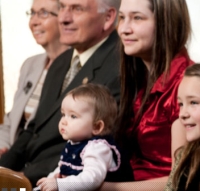
Family Integration
The following is an edited excerpt from a letter I wrote to a pastor friend. I thought I would share it online and would love your thoughts and feedback.
Allow me to share a little of our thinking concerning where the Lord has led us, especially in regards to family integration. This is a subject that evokes much emotion and, I believe, often argues from hyperbole.
We have had several negative experiences with other churches and families who would call themselves “family integrated.” As a result, and after much reflection on the issues, we have coined the terms “ecclesiastical family integration” vs. “patriarchal family integration” to discuss our position on the matter. The one is oriented toward the church, while the latter finds its frame of reference in the family.
The “reason” we worship together on the Lord’s Day is not because of our view of the family and the need to keep the family together: we worship together because of our understanding of the nature of the church as “one body.”
We believe this is the biblical reason for “family integration.” The “family” that is integrated is the “family of God.” We would reject, for example, statements such as “the family is the building block of the church.” While it is true that “strong families make strong churches,” the scriptures teach that we are members “individually one of another” (cf. Rom. 12:5; 1 Cor. 12:27). The “living stones” that make up the church are not families, but individual redeemed people who make up the corporate, covenant body of Christ.
Our position, ecclesiastical family integration, is not subject to the extremes of hyper-patriarchalism – setting dad up in the church with such expressions as dad administering the supper to the family as the “priest” in home, barring his children from the supper (overstepping his authority into that which is purely ecclesiastical), etc.
And this balanced view of the nature of the church allows us as elders to minister to the entire body, even if that means at times segments of that body. For example, like your church, we don’t have a traditional “youth ministry,” modeled after the marketing demographics of the world. We see that children are to be raised to be godly young adults, not “rebellious teens” with their own language, culture, dress, pastor, music, etc. But we also recognize the need for pastoral involvement and direct shepherding of our young adults. So on the Lord’s Day afternoon, on occasion, we’ll have a “young adult study” where the elders will teach and have discussion with our young adults in a separate class time where we pastorally address issues related to training them up to adulthood. To the ardent “family integrated” crowd this is unthinkable. However, the objections that are raised are typically from the unbiblical view of the family-church relationship or are an overreaction against the pervasive segregation in the modern evangelical church.
What I find fascinating (and a double-standard!) is that many who are strong in the family integrated movement (can I even speak of it in those terms with the great diversity in practice and churches?) will have “mother / daughter events” and clubs for the young men, etc. They seem to recognize that God has made us to benefit, to some degree, from participation, teaching and “segmented” activity – but only on their own terms. It’s fine, for example, for the ladies of the church to all read the same book and get together on Saturday mornings to discuss it – so long as they bring their daughters with them they are not violating the “family integrated principle” that God etched in stone from Sinai (didn’t he?); Or for men and boys to get together to build potato cannons, etc. while the ladies (segmented, mind you!) learn to bake bread. It seems that so long as the activity is “wholesome” the segmentation is acceptable.
And the same folks are horrified at the thought of having their children taught by elders or other qualified teachers exercising their gifts during a Sunday School hour. God forbid! “We’ll destroy the fabric of the family!” Personally, I believe there is a biblical balance that I don’t see in many who have drunk deeply at the well of Vision Forum (Although I appreciate much of what VF produces) and like ministries.
With all of this said, keep in mind that we have a single Sunday School class. However, as I’ve been teaching through Ephesians verse by verse I have often thought that it would be profitable if the younger children had a class where they could do character studies, do catechism work, bible memorization, learn hymns, write letters to shut-ins, practice songs to sing at the retirement home, etc. Certainly there is value in listening to our study – and yes they do “get something out of it” – and yes there is a cumulative aspect to sitting under God’s word taught. All of these are valid.
However, as I see it, the same things apply (and I can actually make a biblical argument for them) especially in regards to the corporate nature of the worship of God. I’m just not too sure how much I would press these “principles” to every single aspect of biblical ministry so that I reject out of hand all “age segregated ministry.” Simply pointing to Eph. 6 to demonstrate that children were present when Paul’s letter was read does not demonstrate that there’s never a time to have segmented ministry – whether for young adults, children, senior saints, men’s studies, women, etc. But we must do so with a deliberate, biblical view of the oneness of the body without creating a culture of disunity.
Related Topics:
